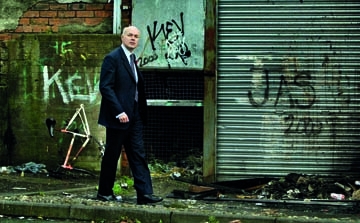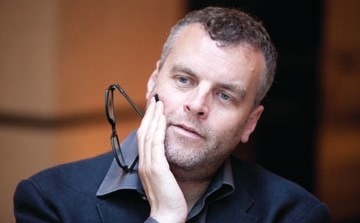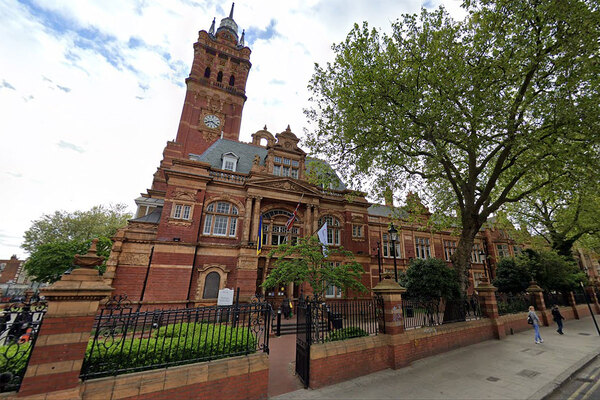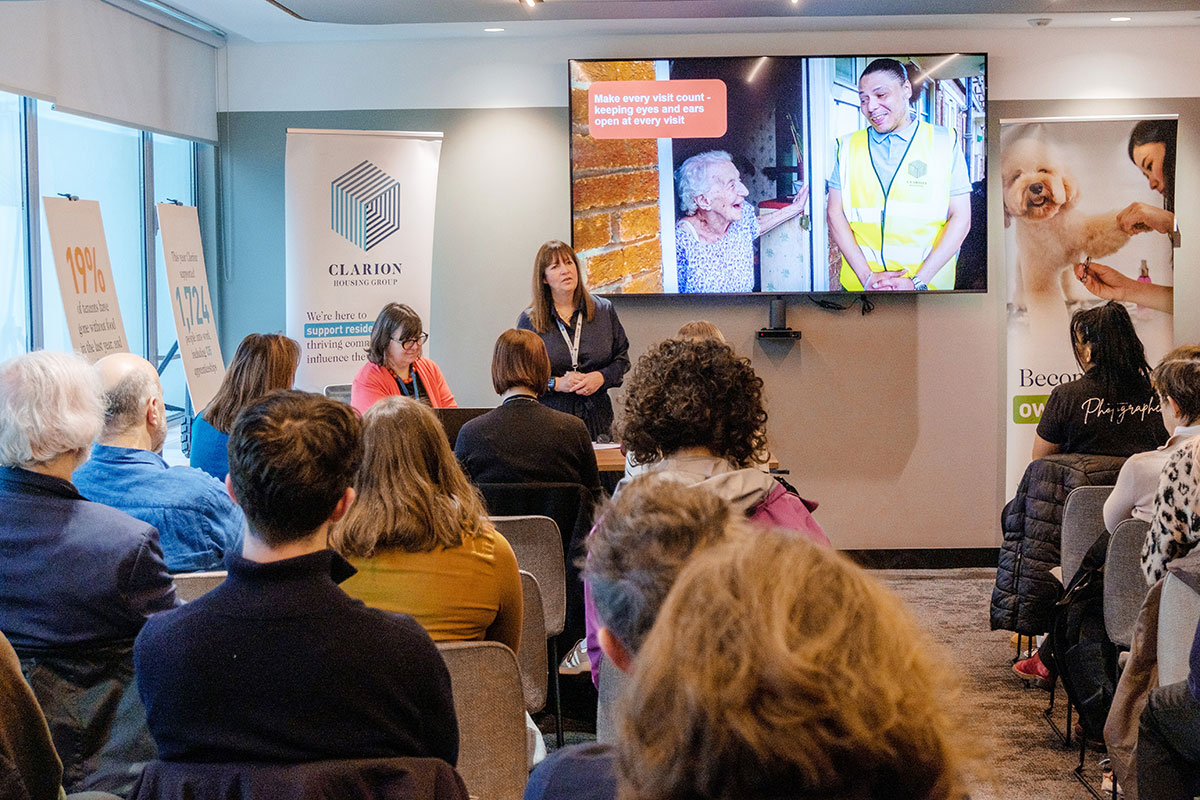You are viewing 1 of your 1 free articles
Tim Montgomerie: Family guy
Tim Montgomerie is one of the most influential Conservative thinkers in the UK, a close ally of work and pensions secretary Iain Duncan Smith and a vocal proponent of marriage and family life. Martin Hilditch finds out why housing policy is increasingly exercising his mind
When I meet Tim Montgomerie he’s somewhat incongruously tucked away in an alcove that’s plastered with framed copies of political cartoons from The Guardian.
If Mr Montgomerie has noticed the distinctly left-wing décor he doesn’t mention it (he’s also sitting in the plush loins of the InterContinental Hotel, a stone’s throw from London’s St James’s Park, so the overall effect isn’t exactly Marxism in action).
Truth be told, there are probably other things on his mind - although a faded Union Jack tag attached to the zip of his rucksack suggests that he’s not oblivious to political aesthetics. One of the most prominent Conservative thinkers over the last 10 years, he helped set up the Centre for Social Justice think tank with Iain Duncan Smith, founded the influential Conservative Home website and currently writes leaders and opinion pieces for the Times. A close friend and political ally of Mr Duncan Smith, he is responsible for setting up the famous 2002 visit to the deprived Easterhouse estate in Glasgow - often cited as the ‘epiphany’ that started the work and pensions secretary on the road that’s culminated in his ambitious and controversial welfare reform agenda. One way or another, modern conservatism would be a very different place without Mr Montgomerie.
Right now, he’s putting the finishing touches to a book that will set out ‘the 10 steps’ that he believes the Conservative Party should follow in order to create ‘the kind of conservatism that deserves to win elections’. Make no mistake, Mr Montgomerie is pitching a new vision for the future of the Conservative Party. And housing, he states, has to be right up there at the top of the agenda.

Source: Belinda Lawley
He might not be the most familiar figure to the housing sector - but if his ideas gain traction in the party he may have a fairly fundamental say in its future. This is a man who should be on your radar.
So why does Mr Montgomerie think the Conservative Party needs to change? Why does he think housing policy has to be central to its future? And how exactly did his early work with Mr Duncan Smith help shape the welfare policies being enacted today?
The roots to his approach to all of the above questions appear to lie deep in his personal and political background. Mr Montgomerie certainly sounds like he was fiercely independent in his thinking from an early age. His Christianity and Conservative politics, two of the most important planks of his life, don’t seem to have been directly inherited from his upbringing in Hampshire. In fact, the only person in his family who was passionate about politics was his grandmother, who worked for former Liberal leader Jeremy Thorpe.
‘She never really approved of my politics,’ he says with a smile. ‘But there’s no one else in my family who is particularly political, so I don’t quite know where I got my interest from other than from her.’
Similarly, his active religious life started at around the age of eight when ‘I just said to my parents “why don’t we go to church?”,’ before his beliefs deepened at around 15.
Promoting marriage and a stable family life has been a key theme of his political thinking throughout his career, partly down to his own background - ‘great parents - it makes a difference, the family’ - and his religion.
Quietly spoken and considered, Mr Montgomerie is no arm-waving controversialist - although he is forthright in his opinions. When we meet he has just been Tweeting his displeasure with Oxfam’s campaign against welfare cuts with the words ‘I hope the Charity Commission investigates @Oxfamgb. It looks like it’s becoming dangerously political’. But it’s the future of housing policy and how this links with family life that is increasingly exercising him.
‘I’ve been on a long quest to think about what kind of policies most help families and that’s one of the reasons why I’ve ended up with a growing interest in housing policy,’ he states.
Mr Montgomerie already has at least one big fan in the housing sector - he was best man at the wedding of Cameron Watt, chief executive of the Northern Ireland Federation of Housing Associations.
‘He’s a lot gentler and kinder than a lot of people you find operating in politics,’ Mr Watt states. ‘He has a very winsome way of operating. He’s an incredibly able person. I’ve got immense respect for him.’
Mr Watt says that his friend, who he met while working at Conservative Central Office in 2001, has had a ‘very significant influence’ over the Conservative Party over the last 10 years.
‘I think that whole emphasis on the simplification of the benefit system and making work pay - that was something Tim had a major role in,’ he says.
Career path
After setting up the Conservative Christian Fellowship when he was at university in 1990, Mr Montgomerie joined Conservative Central Office, working on outreach to faith communities, in 1998. He became friendly with Mr Duncan Smith, working to develop his social justice agenda from 2001 and eventually becoming his chief of staff in 2003, shortly before Mr Duncan Smith lost the leadership of the Conservative Party.
‘We got on very well from the first time we met,’ Mr Montgomerie says. ‘We hardly - and this is sort of slightly frightening for many people - disagree on anything. We see the world incredibly similarly.’ He speaks about Mr Duncan Smith in glowing terms, referring to him as ‘arguably the most influential Christian in public life today in Britain’ and describing his friendship as a ‘defining political and personal relationship’. This is not least because of the lows as well as the highs.
‘After he lost the leadership [in 2003] not many people wanted to be associated with Iain,’ he states. ‘When you are with someone in those times you forge a good friendship. It’s a relationship that will endure.’
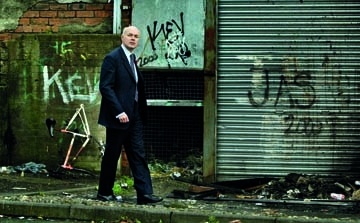
Close ally: Iain Duncan Smith on his visit to the Easterhouse estate
It turns out, however, that while the visit to the Easterhouse estate may have been a gamechanger for Mr Duncan Smith in the public consciousness, it didn’t necessarily hugely alter his thinking.
‘He’d said things on the “help the vulnerable” agenda - although I never really liked that title - before but none of them had quite taken off,’ Mr Montgomerie states. ‘Easterhouse was where I think it all came together. It just so happened there was lots of media there on the day he went to Easterhouse. It caught the media’s imagination.’
Next came the Centre for Social Justice, which Mr Montgomerie co-founded, and from which sprang much of the thinking that has helped inform Mr Duncan Smith’s current role at the Department for Work and Pensions.
All for reform
Broadly Mr Montgomerie is supportive of the welfare reforms that have been introduced, stating ‘I think people do feel that the state has been indiscriminately generous to people’ and that ‘welfare reform is largely popular’.
He acknowledges though that the bedroom tax - or spare room subsidy as we call it today - is ‘the one that has been the most difficult’. But that’s about as critical as he gets, immediately adding: ‘Perhaps the implementation could have been different, but I think the general principle that there are some people in houses that are too big for them and to try and get people to move into the right size houses is a good one.’
Nonetheless, even if welfare reform is broadly popular in the polls, Mr Montgomerie thinks there is a wider danger for the Conservative Party if it is perceived to be obsessed with the issue.
‘Conservatives have never made peace with the safety net,’ he says. ‘Partly because Tories love rags-to-riches stories. But that is never going to be most people’s experience. Most people want a party that will ensure that they never fall too low, where they have got a roof over their head. By looking like you’re worried about social security too much, you frighten those people.’
Instead, the party should be offering longer-term solutions and hope, he suggests. And that means addressing the housing crisis - ‘and it is a crisis’. In many ways this means revisiting Conservative Party policy from the pre-Thatcher era, he states.
‘I think one of the problems from the Conservative Party is that we have sometimes given the impression that Conservative history began in 1979. It didn’t. Mrs Thatcher was a hugely successful leader, but there are other aspects of Conservatism, including Chamberlain in the 1930s building houses and Macmillan building houses. I think the party needs to recover some of that.’
State involvement in the housing sector is inevitable in some shape or form because of housing benefit, he adds. ‘We need to be spending less on benefit and we will if we get private rents down and have more houses to put people in.’ The solution can only be ‘massive increases in building,’ he states. ‘I’m quite enthusiastic about the garden city movement. I think we need to be building a whole range of large new settlements.’
He’s not a fan of chancellor George Osborne’s help to buy solution, however. ‘I don’t think help to buy is a very good policy. I think support for people who can afford to pay a mortgage but can’t put a deposit together is a good principle, but without a supply-side response it’s dangerous. You’re just pouring money into a fixed market. It’s almost inevitably - basic economics - inflationary.’
So, house building it is, then. ‘I’ve come to think that the best pro-family policy is a house building policy,’ he states, before adding that the Conservative Party should make its house building credentials as explicit as possible by changing its logo. ‘Scrap that oak tree and put a home as the logo,’ he says with a smile.
Stepping stone
Nonetheless, while Mr Montgomerie is obsessed with giving families as much stability as possible, this doesn’t necessarily extend to encouraging people to view social housing as a permanent home. Social landlords may want to sit up and take note of his vision for them going forward.
‘I think social housing should be a stepping stone as much as possible,’ he says. ‘I think reforming the tenure of social housing so that people see it as a stepping stone is right. I do think we need to create more affordable housing and more affordable rented accommodation, but I’m probably inclined to think that the public money should largely go to infrastructure rather than the housing itself.’
With that our time draws to a close and Mr Montgomerie has to head off. You can bet that his ideas will influence the debate about housing, welfare and the Conservative Party’s election strategy throughout the next 12 months. So pay attention, because Mr Montgomerie’s thoughts today may well feed through into policies that will affect the housing sector - and the families it houses - for years to come.
Mr Montgomerie is speaking at the Chartered Institute of Housing conference on Tuesday 24 June at 4.00pm in the Exchange Auditorium
Tim Montgomerie on…
David Cameron: ‘The Conservative Party clearly needs to modernise and change. But the modernisation that David Cameron focused on was largely the wrong kind.
The big problem for the Conservative Party is this sense of [it being] a party for the rich that will leave people on their own in tough times. So the modernisation should have always been focused on social justice - solidarity conservatism.’
Boris Johnson: ‘He is probably the next leader of the Conservative Party and he is very focused on housing - and nowhere is there a bigger problem than in London.’
Ed Miliband: ‘The next election should be there for a good Labour leader to win, but Ed Miliband is not a good Labour leader.’

